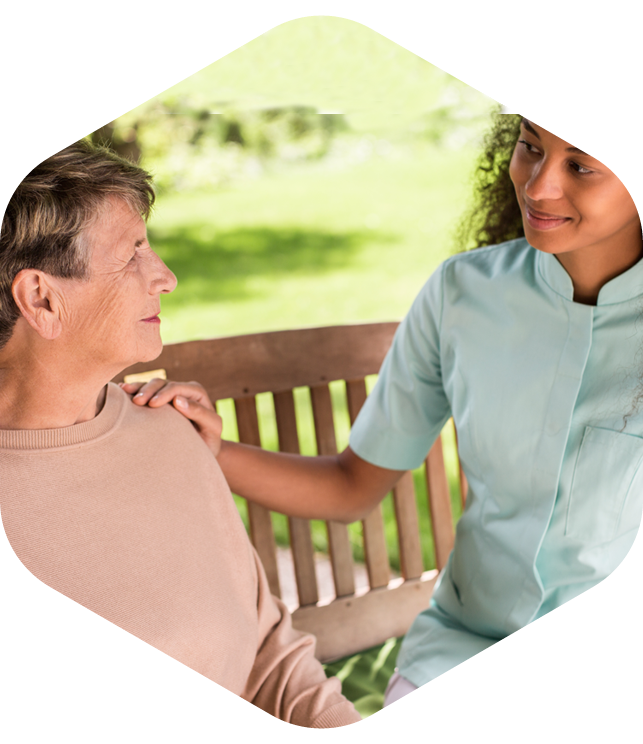Psycho-Oncology’s Help on Patients’ Professional and Social Life after Treatment
Therapeutic strategies allow facing the challenges of moving forward

It’s estimated that between 15% and 40% of those who underwent cancer treatment still struggle psychosocially, e.g., connecting with family and friends and returning to work.1,2
Psycho-oncology presents therapeutic activities that help with psychological, behavioral, social and wellness issues after cancer treatment.3,4 Some of the strategies focused on smoothing the return to the social and professional routines are:
Support groups that help social reintegration - In these groups, people seek to relieve the stress caused by cancer treatment by sharing their experiences. That way, they find support to build healthy relationships with family and friends.1,5,7
Vocational rehabilitation - This will make returning to work easier with practices and techniques for reintegration to the professional environment. Going back to work is also a way to reconnect with people and to reach autonomy again.1,6,7
Programs for reducing stress caused by cancer - The treatment’s adverse reactions can generate emotional stress and anxiety/depression symptoms. As a way of preventing this, psycho-oncology has strategies for dealing with these emotions during and after treatment.1,7
Relaxation and meditation techniques to relieve anxiety - These are meant to practicing mindfulness, which helps focusing on the present moment and reaching a soothing and calm mental state. This makes it easier to reduce and even avoid thoughts that may trigger anxiety crises.1,7,8
Lifestyle changes after cancer treatment
A lot of people who go through cancer treatment like to use the experience as a turning point to live a healthier life. Psycho-oncology helps focusing on health and holding on to these changes.2 Amongst the most common lifestyle changes after the end of cancer treatment and beginning of psycho-oncology therapy are:2
- Starting practicing exercises;
- Having a healthier diet;
- Stopping smoking;
- Protecting skin from the Sun;
- Limiting alcohol consumption;
- Seeking a less stressful routine.
Besides psycho-oncology, there are other practices that help reestablishing a new routine. Learn more about other ways to recover life quality after cancer treatment.
References:
1 - Grassi L, Spiegel D, Riba M. Advancing Psychosocial care in cancer patients. Available at: https://www.ncbi.nlm.nih.gov/pmc/articles/PMC5717468/. Access on: November/2019.
2 - Recklitis CJ. Provision of integrated psychosocial services for cancer survivors post-treatment. Available at: https://www.ncbi.nlm.nih.gov/pmc/articles/PMC5865587/. Access on: November/2019.
3 - Lang-Rollin I. Psycho-oncology. Available at: https://www.ncbi.nlm.nih.gov/pmc/articles/PMC6016045/. Access on: November/2019.
4 - Psycho-Oncology – Model of Care. Government of Western Australia, Department of Health. Available at: https://ww2.health.wa.gov.au/~/media/Files/Corporate/general%20documents/Health%20Networks/WA%20Cancer%20and%20Palliative%20Care/Cancer/Psycho-Oncology-Model-of-Care.pdf. Access on: November/2019.
5 - European Guide on Quality Improvement in Comprehensive Cancer Control. Available at: https://cancercontrol.eu/archived/uploads/images/Guide/pdf/CanCon_Guide_FINAL_Web.pdf. Access on: November/2019.
6 - Ullrich A, Rath HM, Kerschgens C, Raida M, Aukamp CH - , Bergelt C. Return to work in prostate cancer survivors – findings from a prospective study on occupational. Available at: https://bmccancer.biomedcentral.com/articles/10.1186/s12885-018-4614-0. Access on: November/2019.
7 - Life after cancer treatment. Available at: http://www.grhosp.on.ca/assets/documents/life_after_cancer_treatment_en_may2013.pdf. Access on: November/2019.
8 - Mehta R, Sharma K, L Potters, Wernicke AG, Parashar B. Evidence for the Role of Mindfulness in Cancer: Benefits and Techniques. Available at: https://www.ncbi.nlm.nih.gov/pmc/articles/PMC6623989/. Access on: November/2019.
Know more about the subject

The Cancer Patient’s Caregiver May Need Help Too
There are several options of intervention that can bring positive results for both the caregiver and the patient. 2

Tips for Safely Preparing Food for Cancer Patients
Carefully choosing items and keeping a good hygiene when preparing meals are essential to avoid contamination.

The Importance of Caregivers for Those Undergoing Cancer Treatment
With treatments’ side effects, caregivers can help in everyday chores and keep patients safe.

How Social Support Networks Can Help People with Cancer
The stronger the social support network’s connection is, the more significant is its help.1

What Does the Information on Nutrition Facts and Food Labels Mean?
Knowing what you're eating helps you make healthier choices.

What to Say to a Person with Cancer and What Not to Say
Beyond words, it's also important to show support by listening carefully.2



